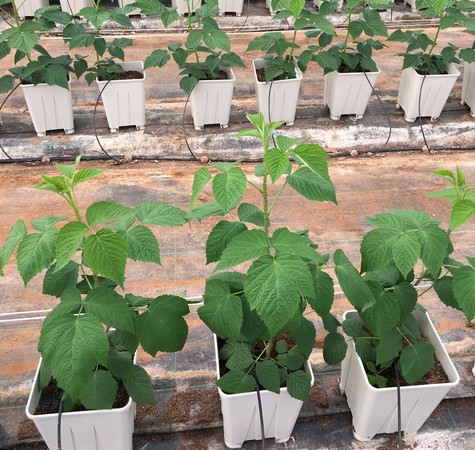Raspberry can be cultivated in many climates, but due to its Mediterranean origin, the highest productions are obtained in temperate climates where summers are not excessively hot and winters are not too hard. Climatic conditions significantly influence certain raspberry varieties so that they behave as remontant (two flowering per year) or not remontant (one flowering per year).
"Regarding soil conditions, raspberries are very demanding in terms of moisture availability, especially during the reproductive phase. The soil must be deep, to facilitate root development, and humid, but without drainage problems," explains Alejandra Pintos, Projar's Marketing Director. "The best soils for raspberry cultivation are sandy loam, loam, and clay loam. The organic matter content in soil should be higher than 5% to preserve moisture, temperature and to improve the structural and chemical characteristics of the soil. The pH should be between 6 and 6.8 in clay-siliceous soils."

"However, the development of soilless or hydroponic cultivation methods opens up the possibility for growers all over the world to grow raspberries independently of soil conditions," he adds.
"Growing crops in controlled environment agriculture can avoid technical limitations due to the type of climate or soi in the area and also optimizes the use of resources such as water, energy, space, capital, and labor."

Solutions for raspberry propagation and production
Projar is specialized in the manufacturing of substrates and coir products, which allows them to produce tailor-made substrates adapted to the needs of each client.
The company has been developing and implementing solutions for the hydroponic cultivation of berries for more than 15 years and offers a broad portfolio of products and solutions for the soilless cultivation of blueberries, strawberries, raspberries, and blackberries.
They have therefore developed an all-in-one solution package for raspberry cultivation that includes pots, peat, trays, coir substrates and agro-inputs. "In this way, customers will find all the solutions in one supplier," Alejandra says, explaining that their main competitive advantage lies in the personalized attention the grower receives.
"Expert agronomists with international experience in hydroponic cultivation advise the growers in situ, accompany them in the execution of the project and carry out a post-delivery follow-up to guarantee the success of the production. During the process, the development team is at the customer's disposal to customize the products to the needs of each project," he explains.
"Growers feel supported and accompanied in all phases, reducing risks and obtaining a complete service from a single supplier. Our objective is to help the farmer to reduce costs and increase the quality and yield of the crop, and this is highly valued by the professional growers." .
For more information:
Projar
marketing@projargroup.com
www.projarinternational.com

